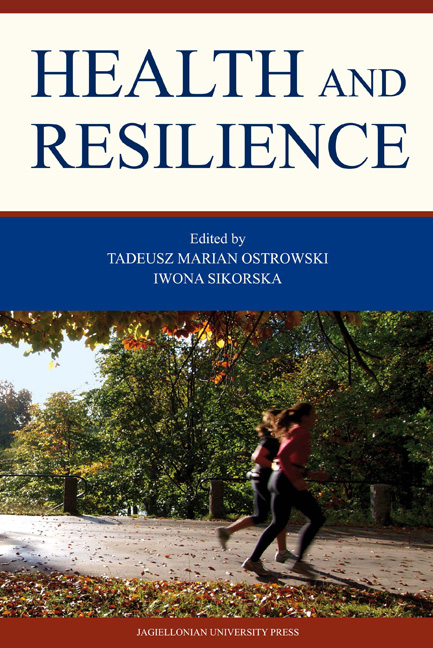Book contents
- Frontmatter
- TABLE OF CONTENTS
- Introduction
- I SOCIAL AND METHODOLOGICAL CONTECTS OF RESILIENCE
- II RESILIENCE IN DEVELOPMENT
- III RESILIENCE AND DISEASE
- Resilience as a chance of developmental success for a child with a chronic illness
- Coping with stress amongst families with children suffering from chronic psychosomatic diseases – recommendations for psychoprophylactic actions
- Styles of coping with negative emotions and stress in patients with hypertension
- Family life dimensions and self-assessment of adolescents and young adults using psychoactive substances – the comparative studies
- List of Authors
Styles of coping with negative emotions and stress in patients with hypertension
from III - RESILIENCE AND DISEASE
Published online by Cambridge University Press: 05 December 2014
- Frontmatter
- TABLE OF CONTENTS
- Introduction
- I SOCIAL AND METHODOLOGICAL CONTECTS OF RESILIENCE
- II RESILIENCE IN DEVELOPMENT
- III RESILIENCE AND DISEASE
- Resilience as a chance of developmental success for a child with a chronic illness
- Coping with stress amongst families with children suffering from chronic psychosomatic diseases – recommendations for psychoprophylactic actions
- Styles of coping with negative emotions and stress in patients with hypertension
- Family life dimensions and self-assessment of adolescents and young adults using psychoactive substances – the comparative studies
- List of Authors
Summary
Abstract
The goal of the study was to answer the question: which and what are the specific styles of coping with negative emotions (anger, anxiety, sadness) and stress used by healthy individuals as compared to those suffering from hypertension?
The study involved 203 people from 50 to 65 years of age, where the clinical group consisted of 100 hospitalized patients suffering from hypertension and a control group of 103 healthy individuals. The study was carried out by using:
(1) The Questionnaire on Emotion Regulation (FEEL) and
(2) The Coping Orientations to Problems Experienced Scale (COPE).
It has been shown that in experiencing negative emotions and stress, non-adaptive styles and strategies for regulating negative emotions are characteristic of people with hypertension (resignation, withdrawal, self-humiliation, perseveration, F = 7.44, p = 0.0001), explaining 15.9% of the total variability of the results.
Using the method of cluster analysis on the distributions of results from both groups, six styles of coping with negative emotions and stress were identified: (1) defensive, (2) masochistic, (3) activist, (4) mildly defensive, (5) constructive and (6) confrontational (F = 40.10, p = 0.0001), showing in detail (χ2 = 33.01, df = 5, p = 0.0001) that styles 2 and 4 are more characteristic of the group of people with hypertension, whereas styles 3, 5 and 6 of healthy people.
- Type
- Chapter
- Information
- Health and Resilience , pp. 169 - 192Publisher: Jagiellonian University PressPrint publication year: 2014



